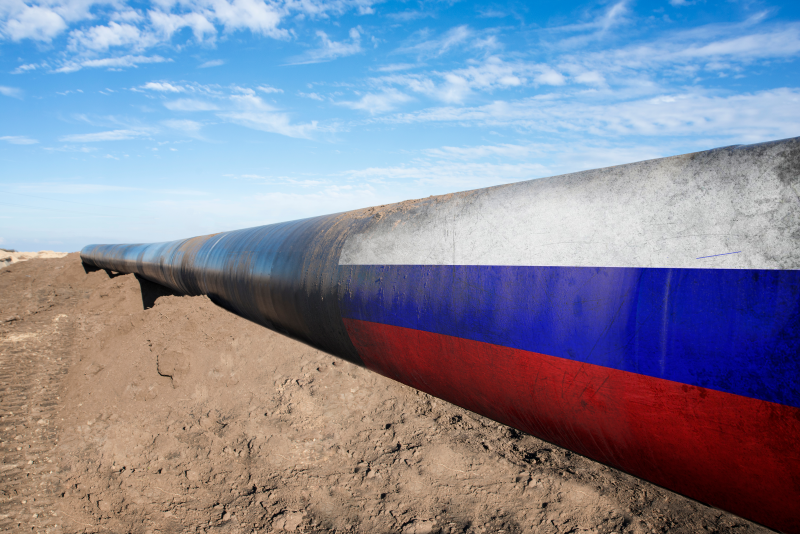Sources: Disagreements Delay Russian Gas Hub Plans in Turkey
(Reuters) — Russia's push to create a "gas hub" in Turkey to replace lost sales to Europe is facing delays because of disagreements over who should be in charge of it, two sources familiar with the project told Reuters.
Russian President Vladimir Putin proposed the idea in October 2022, shortly after explosions damaged the Nord Stream gas pipelines linking Russia to Germany across the Baltic Sea. It remains unclear who was responsible for the blasts.
A source familiar with the situation said the gas hub plan had faced delays because Moscow and Ankara were squabbling over control.
"There are managerial issues, they are fighting for who should manage the hub," the source said on condition of anonymity as he was not authorized to speak to the media.
Another source, close to Kremlin-controlled gas giant Gazprom, acknowledged there was a "problem" over the management issues.
Gazprom and the Turkish energy ministry did not respond to requests for comment.
Russia sees the hub as a way to re-route its gas exports now that European countries have sharply cut their buying. It hopes to sell some gas via Turkey to countries that would not be willing to buy directly from Russia.
Moscow currently supplies gas to Turkey via the Blue Stream and TurkStream pipelines across the Black Sea. Gas via TurkStream also goes for further exports to southern and eastern Europe, including Hungary, Greece, Bosnia and Herzegovina, Romania and Serbia.
Some Western capitals are concerned that any Turkish gas hub that includes Russian gas could allow Moscow to mask exports that are sanctioned by the West over its actions in Ukraine, by mixing the fuel with that from other sources.
Turkey is a NATO member but has good relations with Russia, though ties have been strained over some issues including Russia's decision in July to withdraw from a Turkish-brokered deal that had enabled Ukraine to export grain via the Black Sea.
Turkey currently imports nearly all its gas and has extensive liquefied natural gas import infrastructure. Ankara believes it can leverage its existing and new trade relations to become a gas hub.
Putin said in July that the gas hub was still on the agenda, and Russia wanted to set up an electronic platform for gas sales in Turkey.
At a meeting with his Turkish counterpart Tayyip Erdogan on Sept. 4, Putin said Gazprom had submitted a road map for the hub to Turkish energy company BOTAS.
He said issues included creating a joint working group, drawing up a legal framework, and "schemes for the trading and transfer of purchased gas".
The Kremlin has said that the hub is a complex project that will require time to come to fruition. Its spokesman Dmitry Peskov had first said in February that there could be delays with the plan because of a devastating earthquake that struck southeast Turkey and Syria.
Turkey is pushing its own gas exporting agenda: BOTAS in August struck an agreement with Hungary's MVM to sell about 300 million cubic meters (mcm) of gas. That marks the first time Turkey has agreed gas exports with a non-neighboring country and may indicate its willingness to boost the security of European energy supply.
Turkey has said it would also be possible to include the Trans Anatolian Natural Gas Pipeline (TANAP), which carries Azeri natural gas to the Turkish border, into the proposed hub.
Russia supplies pipeline gas to Europe mainly via Ukraine at a rate of over 40 million cubic meters per day, less than half the amount it used to sell to the European Union before the Ukraine conflict via that route.
The Kremlin has said that the TurkStream gas pipeline cannot replace the capacity of the damaged Nord Stream.
In August, Gazprom supplied the European Union via Ukraine and TurkStream some 2.84 Bcm of gas, of which 1.54 Bcm was shipped through Turkey and 1.3 Bcm via Ukraine.
In 2022, Russia's total pipeline gas exports almost halved to 100.9 Bcm, a post-Soviet low.
The existing TurkStream cost $3.2 billion and the never-launched Nord Stream 2 gas pipeline via the Baltic Sea another $11 billion, shared between Gazprom and its Western partners.
Many countries have pledged to end or restrict their oil and gas imports from Russia to curtail Moscow's revenues. The EU said in March it would cut gas imports from Russia by two-thirds within a year. The UK, which only imported small quantities of Russian gas, has cut imports completely.
Related News
Related News

- Keystone Oil Pipeline Resumes Operations After Temporary Shutdown
- Freeport LNG Plant Runs Near Zero Consumption for Fifth Day
- Biden Administration Buys Oil for Emergency Reserve Above Target Price
- Mexico Seizes Air Liquide's Hydrogen Plant at Pemex Refinery
- Enbridge to Invest $500 Million in Pipeline Assets, Including Expansion of 850-Mile Gray Oak Pipeline





Comments